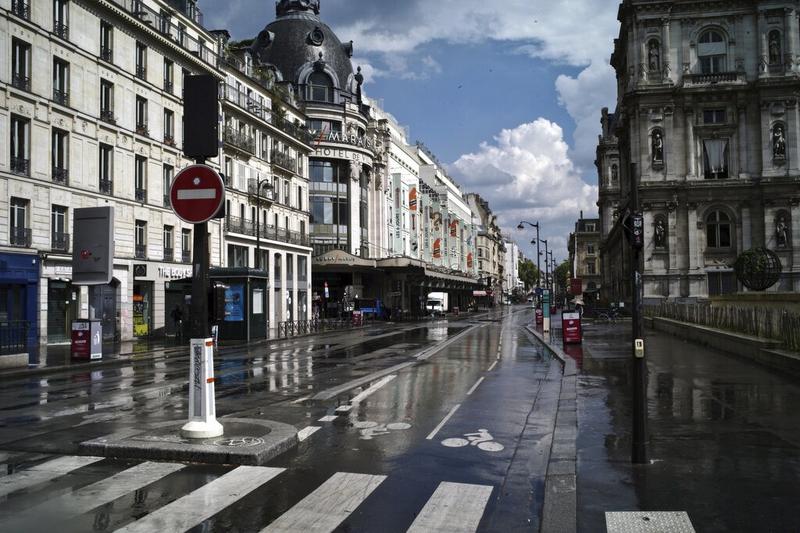 This April 27, 2020 photo shows a view of the deserted Rivoli street in Paris, France, amid nationwide confinement measures to counter COVID-19. (THIBAULT CAMUS / AP)
This April 27, 2020 photo shows a view of the deserted Rivoli street in Paris, France, amid nationwide confinement measures to counter COVID-19. (THIBAULT CAMUS / AP)
WASHINGTON / BRASILIA / MEXICO CITY / SAN JOSE / ROME / PADUA / BUENOS AIRES / BRUSSELS / GENEVA / LAGOS / CAPE TOWN / LONDON / BERLIN / KINGSTON / OTTAWA / KIGALI / VIENNA / MOSCOW / PRAGUE / KIEV / KAMPALA / LISBON - French Prime Minister Edouard Philippe said a lockdown imposed to curb the spread of the coronavirus has saved tens of thousands of lives but that it was time to ease the restrictions to stave off economic collapse.
The death toll in France passed 23,000 on Monday, the world’s fourth highest behind the United States, Italy and Spain.
But the government is now looking to take advantage of falling infection rates to rescue a free-falling economy, though Philippe said the French people would have to adapt to a new way of living.
“We are going to have to learn to live with the virus,” Philippe told parliament on Tuesday as he began outlining measures to gradually ease the lockdown. “We must learn to live with COVID-19 and to protect ourselves from it.”
France will not end its nationwide lockdown unless the number of new cases of coronavirus infection drops below 3,000 per day, Philippe told parliament on Tuesday.
France would begin emerging from the lockdown on May 11, unless it was unsafe to do so, Philippe said.
By then, France would have the capacity to conduct 700,000 tests per week, the prime minister continued. The state would cover the full cost of testing.
French secondary school pupils returning to school next month after a coronavirus lockdown will be required to wear masks, Philippe added.
Speaking in parliament, Philippe said pupils in junior school would not be required to wear the masks.
Primary schools can reopen from May 11, and high schools will gradually reopen from May 18. The prime minister though said lessons would only resume if there were no more than 15 students present in the classroom at any one time.
ALSO READ: Healthy again, British PM says too risky to relax lockdown yet

People buy fruit and vegetables at a shop in Naples, Italy, April 27, 2020. (ANDREW MEDICHINI / AP)
Virus still 'extremely dangerous'
As more European nations are pondering next steps to ease restriction amid encouraging news, the World Health Organization (WHO) warned on Monday that the novel coronavirus remains "extremely dangerous," stressing the necessity for aggressive measures to peg back the pandemic.
Strict lockdowns for weeks have brought about encouraging signs in various European nations.
As some European nations see a downward trend in daily cases and deaths, the WHO chief urged Europe to find, isolate, test and treat all cases of COVID-19 while easing their containment measures
The downward trend in Italy's new infections is continuing since last week while Spain is also seeing a continuous fall in new COVID-19-related deaths and new cases.
Belgium has registered a drop in the number of new infections and deaths, whereas in France, hospitalizations and the daily death toll have fallen steadily in the past two weeks.
In the UK, British Prime Minister Boris Johnson told reporters on Monday that Britain is passing through the peak "with fewer hospital admissions, fewer COVID-19 patients in ICU."
Amid those encouraging signs, WHO Director-General Tedros Adhanom Ghebreyesus on Monday urged European countries to find, isolate, test and treat all cases of COVID-19 while easing their containment measures.
He stressed that early evidence suggests that most of the world's population remains susceptible, which means epidemics can easily re-ignite.
Global tally
Global COVID-19 cases crossed the 3 million mark Monday and the global death toll topped 211,000, according to the Center for Systems Science and Engineering (CSSE) at Johns Hopkins University.
The United States, which remains the hardest-hit, has reported more than 987,000 cases and more than 56,000 deaths. Trailing behind the US in caseload are Spain and Italy.
Other countries with over 100,000 cases include France, Germany, the United Kingdom and Turkey, according to the CSSE.
As of Monday, the European Region has reported a total of 1,341,851 confirmed cases and 122,218 deaths, according to the WHO dashboard.
Italy
Deaths from the COVID-19 epidemic in Italy climbed by 333 on Monday against 260 the day before, the Civil Protection Agency said, but the daily tally of new cases declined to 1,739 from 2,324 on Sunday, posting the lowest reading since March 10.
The total death toll in Italy now stands at 26,977, the agency said, the second highest in the world after that of the United States. The number of confirmed cases amounts to 199,414.
People registered as currently contracting the illness fell to 105,813 from 106,103 on Sunday.
The northern region of Veneto broke ranks with the national government on Monday and announced it would lift some lockdown restrictions a week ahead of schedule.
Residents in the region, which includes the cities of Venice and Verona, will be allowed to leave their homes from 6 pm (1600 GMT) on Monday and exercise freely. From Tuesday morning, people would be able to travel around the region to visit second homes or to carry out maintenance work on boats.
Portugal
Portugal’s lockdown, which shut most non-essential services last month to contain the spread of the coronavirus, will be lifted gradually from May 3, President Marcelo Rebelo de Sousa said on Tuesday.
“What matters in this new phase is that the Portuguese know that containment remains important so we must take small steps and constantly evaluate,” he told a news conference.
Portugal has reported 24,322 confirmed cases of the new coronavirus and 948 deaths, while in neighbouring Spain more than 23,000 people have died.
The country declared a state of emergency on March 18 when the death toll was just two, with around 642 confirmed cases. It has conducted 370,000 coronavirus tests since March 1, one of the highest testing rates worldwide.
The full plan will be announced on April 30.
Spain
Spain recorded 301 fatalities from the coronavirus overnight, down from 331 on the previous day, the health ministry said on Tuesday.
The overall death toll from the virus rose to 23,822 while the number of diagnosed cases rose to 210,773 from 209,465 on Monday, the ministry said.
Spanish Prime Minister Pedro Sanchez plans to announce loosening measures after Tuesday’s weekly cabinet meeting.
The Spanish cabinet is set to discuss a plan to start phasing out the lockdown, after the government eased restrictions for children over the weekend and said that adults will be allowed out to exercise as of May 3. The administration has said that some regions may reopen before others.
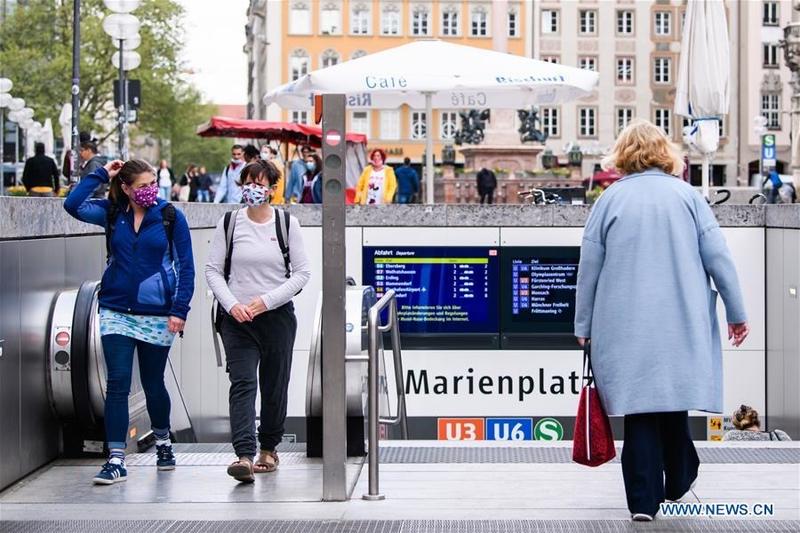 People wearing face masks exit a subway station in Munich, Germany, April 27, 2020. (KEVIN VOIGT / XINHUA)
People wearing face masks exit a subway station in Munich, Germany, April 27, 2020. (KEVIN VOIGT / XINHUA)
Germany
The number of new coronavirus cases in Germany fell below 1,000 for the first time in more than five weeks while the daily death toll picked up slightly, as the nation considers a further cautious easing of restrictions on public life.
Fatalities rose by 150 to 6,126 in the 24 hours through Tuesday morning, compared with Monday’s increase of 99. There were 988 new infections, the lowest since March 19, bringing the total to 158,758, the fourth highest in Europe.
Chancellor Angela Merkel is due to consult with state premiers on Thursday on the next steps in tackling the pandemic. Lower Saxony Premier Stephan Weil on Monday warned against expecting too much, saying it’s too early to know what impact the initial easing of curbs has had on infection numbers.
UK
A contact-tracing app designed to let people know if they have been in close contact with someone who tested positive for COVID-19 could be rolled out widely in Britain in two to three weeks, a senior official said on Tuesday.
The app, and a wider testing and tracking programme, is seen as key to help easing social distancing restrictions in Britain, which have all but shut the economy and stopped people going about their daily lives.
Britain is on track to become one of Europe's worst-hit countries in the coronavirus pandemic, according to data on Tuesday that showed deaths from COVID-19 had already topped 20,000 by April 17, including a fast-rising toll in care homes.
The Office for National Statistics (ONS) said the death toll in England and Wales was 35 percent higher than the daily figures for deaths in hospitals released by the government as of April 17, according to official data that include deaths in the community.
Amid renewed calls for restrictions to be lifted, British Health Secretary Matt Hancock said Tuesday it is still too soon to end the lockdown safely. Moving too early will risk a second spike in infections that the government says would cause many more deaths and “economic disaster.”
“The worst thing for the economy would be for it to continue rattling away,” Hancock said as he answered questions from the public on LBC Radio on Tuesday.
“We do have to get the level of new cases right down and then we can hold it down through testing, tracking and tracing. It is a catastrophe and we’re trying to manage it as best we possibly can.”
On Monday, Hancock said a further 360 people have died from COVID-19 in hospitals, including 82 health workers, bringing the death toll to 21,092. The increase was the lowest daily toll for four weeks, although weekend reporting delays can distort Monday totals.
Meanwhile, Hancock on Tuesday said some children in the United Kingdom with no underlying health conditions have died from a rare inflammatory syndrome which researchers believe to be linked to COVID-19, Hancock said on Tuesday.
Italian and British medical experts are investigating a possible link between the coronavirus pandemic and clusters of Kawasaki disease among infants who are arriving in hospital with high fevers and swollen arteries.
READ MORE: Italy, UK explore virus link to child inflammatory disease
Czech Republic
The Czech Republic has reported its lowest daily rise in new coronavirus cases in more than six weeks as it eases out of a lockdown imposed to curb the spread of infection.
The number of cases rose by 41 on Monday, bringing the total to 7,449, with 223 deaths. The daily increase in new cases has been below 100 since April 22.
From Monday, shops up to 2,500 square metres and public spaces such as fitness centres have been reopened. The government is planning a full-reopening of shops and restaurants by May 25.
Restrictions on gatherings have been loosened, with groups of up to 10 now permitted in public. Czechs are once more allowed to travel abroad but have to present a negative coronavirus test or quarantine when they return.
Russia
President Vladimir Putin on Tuesday extended a non-working period in Russia aimed at containing the spread of the novel coronavirus until May 11.
Restrictions were utindue to be lifted at the end of April, but Putin said the peak of Russia’s coronavirus infections had not yet been reached.
The number of new coronavirus cases in Russia climbed on Tuesday to 6,411, a record daily rise, bringing its nationwide tally to 93,558, the country's coronavirus crisis response centre said.
The number of deaths rose by 72, also a daily record, taking the total number of fatalities to 867.
The figures mean Russia now ranks eighth worldwide for the number of confirmed cases, though it still has far fewer related deaths than the other most affected countries
Austria
Austria will take further steps to ease its lockdown on Friday, allowing events with up to 10 people and instructing the public they no longer need a specific reason to leave home, the government said on Tuesday.
DIY stores, garden centres and smaller shops reopened two weeks ago. Bigger shops and hairdressers will follow from May 1.
Further steps are planned, such as the reopening of cafes, bars and restaurants on May 15. Tourism Minister Elisabeth Koestinger said hotels would be able toreopen from May 29, and the government hoped to let swimming facilities open their doors on the same date.
Austria has fared relatively well in the coronavirus pandemic, reporting roughly 15,000 cases and 549 deaths so far.
Ukraine
Ukraine reported 401 new infections of COVID-19 in the past 24 hours, raising the total number of confirmed cases to 9,410 with 239 deaths, the country's health ministry said Tuesday.
As of Tuesday, a total of 639 children and 1,843 health workers have been diagnosed with the virus, said the ministry.
Separately, Ukraine's armed forces on Tuesday reported 53 cases, including 18 recoveries and two deaths.
 A customer (sitting down) wearing a face mask gets his hair cut by a hairdresser, who is also wearing a face mask, at a barber shop in Lausanne, Switzerland, April 27, 2020. The Swiss authorities partly lifted the lockdown allowing some businesses to reopen, including hair salons. (JEAN-CHRISTOPHE BOTT / KEYSTONE VIA AP)
A customer (sitting down) wearing a face mask gets his hair cut by a hairdresser, who is also wearing a face mask, at a barber shop in Lausanne, Switzerland, April 27, 2020. The Swiss authorities partly lifted the lockdown allowing some businesses to reopen, including hair salons. (JEAN-CHRISTOPHE BOTT / KEYSTONE VIA AP)
Switzerland
Hair salons, garden centers and DIY stores were among some of the businesses in Switzerland that reopened on Monday after a six-week shutdown.
Long queues were seen in major Swiss cities in front of some of those stores, with people carefully sticking to social distancing rules.
Switzerland recorded 103 new COVID-19 cases on Monday, the smallest increase in the past seven weeks.
As of Monday, Switzerland has reported a total of 29,164 confirmed COVID-19 cases and 1,353 deaths, according to the Swiss Federal Office of Public Health.
Greece
Greece reported on Monday two more deaths linked to the coronavirus in the past 24 hours, bringing the total death toll to 136.
The number of confirmed infections rose to 2,534 on Monday from 2,517 on Sunday, officials said at a regular press briefing.
Romania
Romanian President Klaus Iohannis announced on Monday that schools across the country will no longer open in the current school year, which ends on June 12.
Students will continue distance learning until June 12, when the current school year ends, the president said.
Iohannis said that pupils in graduating years may return to school between June 2 and June 12 to prepare for the national exams, but strict social distancing rules must be observed.
At present, the number of diagnosed patients in Romania is increasing by some 300 per day. Authorities announced on Monday that the total number of confirmed cases reached 11,339 and fatalities rose to 631.
Lithuania
Lithuania eased quarantine regulations on Monday, with outdoor cafes, beauty salons, hairdressers, and select cultural, leisure and sport activities allowed to open under certain restrictions.
Starting from Monday, kindergartens can accept children if both parents are working. Cultural, leisure, entertainment and sports facilities are now open to groups of no more than two people.
Lithuania's Minister of Health Aurelijus Veryga said that a complete relaxation of the restrictions was not likely even after May 11.
According to the Ministry of Health, Lithuania had registered 1,449 confirmed cases of COVID-19 by Monday morning. To date, 44 people have died from the disease and 474 have recovered.
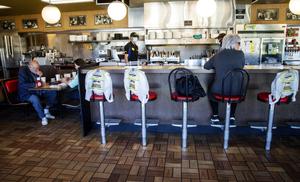 This April 27, 2020 photo shows two diners eating at a restaurant in Brookhaven, Georgia, the United States. The bags covering the chairs indicate where customers can't sit. (STEVE SCHAEFER / ATLANTA JOURNAL-CONSTITUTION VIA AP)
This April 27, 2020 photo shows two diners eating at a restaurant in Brookhaven, Georgia, the United States. The bags covering the chairs indicate where customers can't sit. (STEVE SCHAEFER / ATLANTA JOURNAL-CONSTITUTION VIA AP)
US
The US death toll from the coronavirus outbreak could exceed 74,000 by August, according to the University of Washington's Institute for Health Metrics and Evaluation (IHME) model, often cited by White House officials and state public health authorities.
IHME director Christopher Murray said the death toll would climb if states reopen their economies too early.
Several US states have eased restrictions on businesses, and more are ready to follow. Georgia permitted restaurant dining for the first time in a month on Monday while governors in regions with fewer cases also eased restrictions.
READ MORE: As US death toll tops 51,000, states move toward reopening
The states moving ahead with reopenings, by and large, are concentrated in the South, the Midwest and the mountain West, where outbreaks have generally been less severe than in the Northeast.
The US states of Colorado, Minnesota and Montana plan to relax restrictions advising Americans to stay home. Iowa will resume elective surgeries and farmers' markets by Monday.
Tennessee restaurants and retail stores will be permitted to operate at 50-percent capacity by Wednesday. Hawaii has reopened beaches for exercise and fishing, although sunbathing will not be permitted. Texas on Friday already allowed stores to sell merchandise on curbsides.
New York Governor Andrew Cuomo said he would extend stay-home orders in much of the state on May 15 but may reopen some businesses, including manufacturing and construction, in areas with fewer cases of the virus.
Canada
The government of Ontario, Canada's most-populous province and industrial powerhouse, said on Monday it would not begin lifting restrictions to fight the coronavirus for weeks to come despite pressure from businesses to restart the economy.
Premier Doug Ford said he could not provide a timetable for allowing people in non-essential businesses back to work until the numbers of new cases began dropping steadily.
Canada's death toll grew by less than 10 percent for the eighth day in a row, hitting 2,617, official data showed.
Canadian Prime Minister Justin Trudeau told reporters the provinces were coordinating with Ottawa on how to reopen the economy and stressed the need for extreme caution.
In Quebec, elementary schools and childcare services outside Montreal will reopen on May 11. In the Montreal region, elementary schools will reopen on May 19.
Brazil
Brazil's government is working on a plan to gradually reopen economic activity that has been shuttered in efforts to contain the spread of the coronavirus, and hopes professional soccer matches can resume shortly without spectators, a senior official from the economy ministry said on Monday.
Productivity and Competition Secretary Carlos da Costa said there was still no date for the resumption of business activity or soccer games, and stressed that health and safety will be the main priority in all decisions.
Brazil has recorded more than 66,000 confirmed coronavirus cases and more than 4,500 deaths related to the illness. The economic damage from the outbreak and lockdown is expected to be severe, with some analysts saying the economy will have its biggest annual crash on record.
Argentina
Argentina on Monday banned all commercial flight ticket sales until September, one of the toughest coronavirus travel bans in the world, prompting an industry outcry that the new measure will put too much strain on airlines and airports.
Argentina's decision prompted industry groups including
ALTA, which lobbies on behalf of Latin American airlines, to warn that the decree represented "imminent and substantial risk" to thousands of jobs in Argentina.
A spokesman for President Alberto Fernandez, however, said the decision resulted from a "consensus between the government and the airline sector."
Argentina, which has 3,892 confirmed cases of coronavirus and 192 deaths, has been under a national lockdown since March 20. The government, over the weekend, extended the quarantine until May 10.
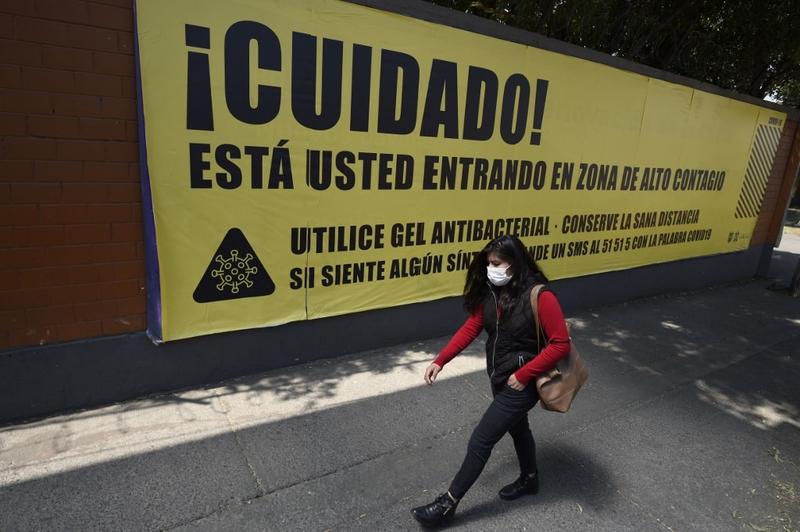 A woman wearing a face mask as a precaution against the spread of the coronavirus walks by a banner warning people they are entering a high-risk contagion area at the Central de Abastos market in Mexico City on April 27, 2020. (ALFREDO ESTRELLA / AFP)
A woman wearing a face mask as a precaution against the spread of the coronavirus walks by a banner warning people they are entering a high-risk contagion area at the Central de Abastos market in Mexico City on April 27, 2020. (ALFREDO ESTRELLA / AFP)
Mexico
Mexico's health ministry reported on Monday 852 new known coronavirus cases and 83 more deaths, bringing the total to 15,529 known cases and 1,434 deaths.
The government has said the real number of infected people is significantly higher than the confirmed cases.
Irma Erendira Sandoval, the head of Mexico's public administration ministry which monitors federal employees, has tested positive for the coronavirus and is in "excellent health and without serious" symptoms, the ministry said in a statement on Monday.
Costa Rica
Costa Rica's government said on Monday it will start reopening its economy and lifting some coronavirus-related social distancing measures from May 1, as the number of active infections has declined for 11 consecutive days.
Movie theaters, gyms and hair salons will be able to open again for business on Friday, but under reduced hours and strict rules on the number of clients allowed at any one time, said President Carlos Alvarado.
Costa Rica will continue to keep its borders, beaches, bars, national parks, churches and educational centers closed, and has banned mass events.
The country has so far reported 697 cases and the death toll has remained at six for a week.
Jamaica
One of the 46 people who arrived in Jamaica on a deportation flight from the United States a week ago has tested positive for the new coronavirus, Jamaican Prime Minister Andrew Holness said on Monday.
The deportees were taken to a quarantine facility upon arrival where they are being screened twice daily, according to the government. They are set to be released two weeks after their arrival.
There are 364 positive cases of the virus in Jamaica, and seven people have died, with more than 50 percent of cases originating from one call center.
Ecuador
Ecuador's Ministry of Public Health reported on Monday that 1,103 people have recovered from COVID-19, as the total number of cases reached 23,240 cases with 663 deaths.
READ MORE: WHO warns against 'immunity passports'
Uganda
Uganda's Ministry of Health on Tuesday flagged off investigation teams to conduct a rapid assessment survey of the prevalence of the COVID-19 pandemic in communities.
According to the ministry, the survey results will be released on May 4, with subsequent decisions to contain the spread of the coronavirus.
The survey will target populations including market vendors, truck drivers and communities along their routes, border crossing points and local communities, health workers, and the security forces among others.
According to official data, Uganda has so far reported 79 confirmed cases, of which 47 have recovered.
Nigeria
Nigeria will begin a "phased and gradual" easing of more than four weeks of lockdowns in the national capital and the largest city on May 4, President Muhammadu Buhari said in an address on Monday.
Lagos and Ogun states and the federal capital territory of Abuja entered lockdowns to tame the spread of the new coronavirus on March 30.
Authorities will enforce an overnight curfew, from 8 pm to 6 am, and also will require all those who are out during the day to wear face masks.
The federal government will also enforce a ban on non-essential movement between Nigeria's 36 states, a measure the governors' forum had requested.
According to the Nigeria Center for Disease Control, as of Monday, the country has reported 1,337 confirmed cases of COVID-19.
Buhari also announced a new two-week lockdown in the northern state of Kano, effective immediately, as cases there have risen to 77.
South Africa
South Africa reported 247 new COVID-19 cases and three more deaths in the past 24 hours, Health Minister Zweli Mkhize said Monday, pushing the tally to 4,793 cases and the death toll to 90.
As massive community testing continued, a total of 178,470 tests have been conducted, of which 9,827 were done in the last 24 hours, Mkhize said.
Also on Monday, Mkhize told Parliament at a virtual meeting that outbreaks at workplaces in Western Cape have made the province the epicenter of the virus, overtaking Gauteng.
Mkhize said the Eastern Cape has also seen a sharp rise in cases due to outbreaks in prisons and infections linked with public gatherings, particularly funerals.
Tunisia
The Tunisian Ministry of Health announced Monday evening 18 new COVID-19 confirmed cases after 263 lab tests were conducted in past 24 hours.
A total of 967 cases have been reported in Tunisia, including 39 deaths, according to a statement by the ministry.
The ministry said in the statement that 279 patients have recovered, 78 others are still hospitalized and 18 in intensive care units.
A total of 21,081 lab tests have been carried out since March 2, when first COVID-19 case was discovered in Tunisia.
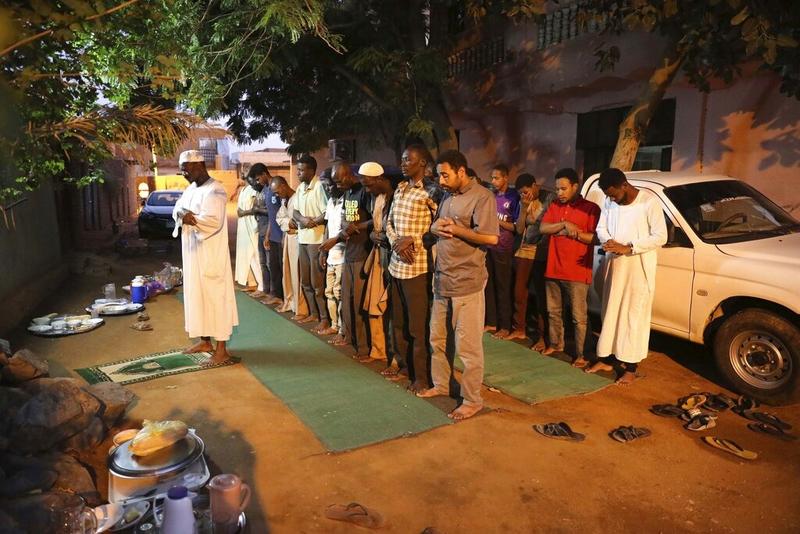 Sudanese men pray after breaking their daytime fast during the Holy Islamic month of Ramadan, on a street in the capital Khartoum, Sudan, on April 27, 2020, amid a curfew imposed due to the coronavirus pandemic. (MARWAN ALI / AP)
Sudanese men pray after breaking their daytime fast during the Holy Islamic month of Ramadan, on a street in the capital Khartoum, Sudan, on April 27, 2020, amid a curfew imposed due to the coronavirus pandemic. (MARWAN ALI / AP)
Sudan
Sudan on Monday announced 38 new COVID-19 cases, bringing the total number of confirmed cases in the country to 275.
The health ministry said that one more death was recorded, pushing the death toll to 22. A total of 21 recoveries have been reported.
Algeria
Algeria on Monday announced the country's lockdown measure will be extended until May 14 as infections with COVID-19 have been increasing, APS news agency reported.
This is the second time the government has decided to extend the nationwide lockdown.
Health authorities on Monday reported 135 new cases and seven more deaths in the past 24 hours, bringing the total infections to 3,517 and the death toll to 432.
Morocco
The death toll from the coronavirus in Morocco reached 162 and confirmed cases have climbed to 4,120 confirmed cases, the health ministry said on Monday.
A total of 55 new cases were confirmed on Monday while 695 patients have recovered so far, said the ministry's spokesman in his daily briefing.
Egypt
Egypt on Monday recorded 248 new COVID-19 cases and 20 deaths, bringing the total number of confirmed cases to 4,782 and the death toll in the country to 337.
Somalia
Somalia's health ministry on Monday confirmed 44 new cases of COVID-19, raising the tally in the country to 480.
Health Minister Fawziya Abikar said three more patients have died, pushing the death toll to 26.
According to Abikar, four more patients have recovered, bringing the total number of recoveries to 14.
Rwanda
Rwanda is trying to mobilize resources to revive the economy from the impact of the COVID-19 epidemic that has brought economic activities in the country to a standstill, Rwandan President Paul Kagame said Monday.
Measures will be taken in key sectors like exports, mining, tourism, investment, construction and manufacturing, according to Kagame.
In addition, Rwanda is negotiating with creditors to postpone debt payment for two years, Kagame said.
The Rwandan cabinet will meet this week to evaluate the steps taken by the country to contain the COVID-19 outbreak before a decision will be made to ease the lockdown, Kagame said.
The health ministry on Monday evening said the number of confirmed COVID-19 cases in the country reached 207 with 93 recoveries.


